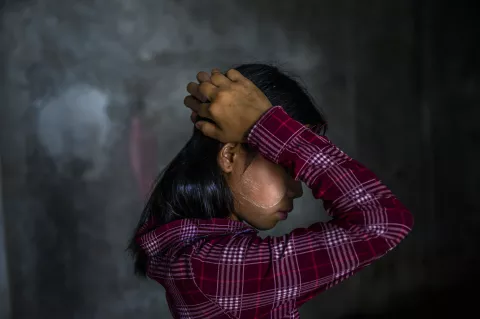Displacement and migration in Kachin State during COVID-19
COVID-19 response in Kachin State

Roi Roi is an 11-year old girl living in Mawzisar internally displaced persons (IDP) camp in Hpakant Township, Kachin State. She has lived in the camp since 2015 after fleeing her village with her family in 2011, amid conflict between the Myanmar Armed Forces (the Tatmadaw) and the Kachin Independence Army (KIA).
More than 96,000 people live in the 138 IDP camps in Kachin State, a state which shares a long border with China’s Yunnan province in the north-east of Myanmar. Historical migration trends show Myanmar migrants, including IDPs, crossing the border from Kachin State into China in search of work and higher wages. Kachin is a state rich in natural resources, namely jade, and lucrative jade mines provide work for a number of IDPs including Roi Roi’s parents. Her stepfather is a jade miner and her mother travels regularly across the border to China to sell jade, where it is in high demand.
“I miss them when they are away. Sometimes, my father comes to see me,” says Roi Roi, speaking about her family.
During the school term, her two sisters live and go to school outside the camp, one stays with an extended family in Kachin’s capital Myitkyina, the other in a boarding school. For most of the year, Roi Roi lives with her aunt and her aunt’s eight family members helping with cleaning, carrying water and baby-sitting. She attends school inside the camp and will begin high school when classes return. Life in the camp is lonely for Roi Roi, but she enjoys the camp’s educational classes and playing with her friends which provides a welcome relief from the stress of daily life without her family,
“I love playing with friends and feel really happy and stress free while playing.”
Between 16 April and 21 May 2020, over 4,000 migrants including IDPs working in China have returned to Myanmar due to the threat of COVID-19 and its consequential job losses. Up to 14,000 more migrants are expected to follow. Returning migrants, including Roi Roi’s mother, must stay in quarantine facilities for 21 days upon their return.
UNICEF is working in close collaboration with the Department of Social Welfare and its partners in Kachin State to ensure children in quarantine centres as well as displaced children are protected. UNICEF, with support from the Government of Japan, provides important COVID-19 awareness materials and psychosocial support for children; has set up child friendly spaces in camps; provides support for child protection case management services. In addition, UNICEF is developing online courses for adolescents and parents in camps on topics such as positive parenting, life skills and child protection through its partner, Kachin Baptist Convention (KBC).
Roi Roi’s mother has finished her time in quarantine and her sisters have also returned to the camp due to school closures. With the support of KBC, the family is staying together in their own shelter and Roi Roi spoke of how happy and secure she feels now they are reunited.
The family has been provided with food, hygiene items, psychosocial support and important information on how to protection themselves from COVID-19. I am truly satisfied to receive this assistance which are definitely needed for us, now I can cook nutritious food for my children,” said Roi Roi’s mother.
Although Roi Roi is happy to be reunited with her mother and her sisters, she is filled with dread, “My mom told me that she will return to China when COVID-19 disappears because she still has to finish her work there. I do not want her to go back to China again because I am worried about her.”
Children in Kachin State face the multi-layered threat of COVID-19, conflict, displacement and the effects of migration and as the number of migrant returnees from China increases, protecting these children and their families is of the highest priority for UNICEF.




